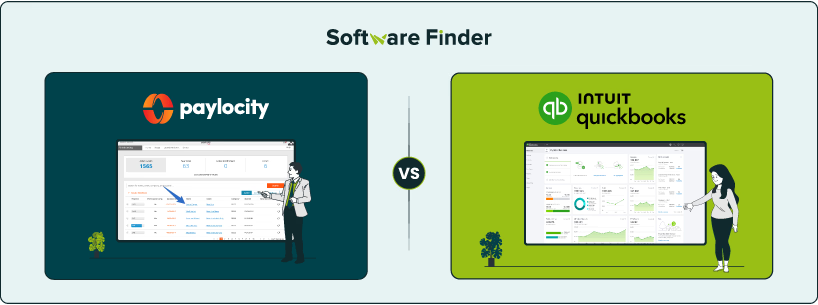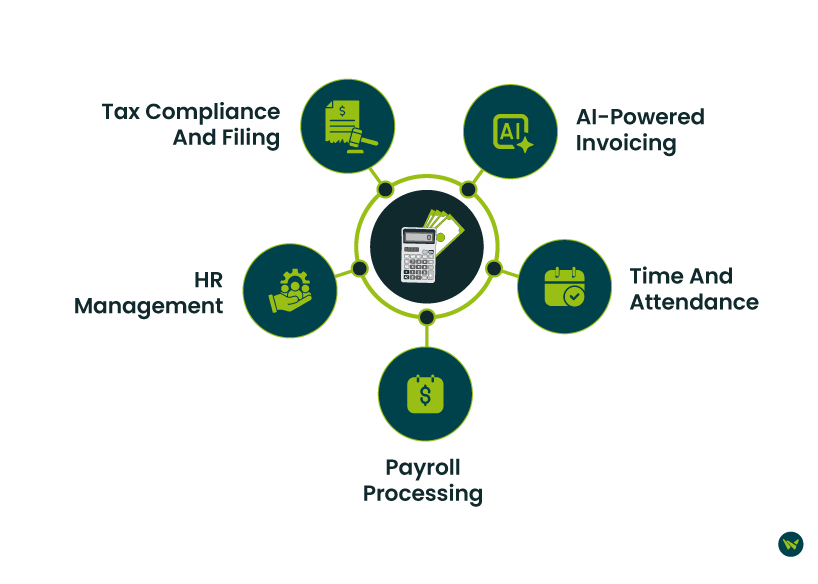
For any organization, payroll management is important because it ensures accurate and timely payment to employees, contributing to their retention and satisfaction. Payroll management software ensures compliance with tax regulations and labor laws, avoiding legal issues and penalties.
With so many options available, companies often struggle to choose the right payroll solution. Paylocity and QuickBooks are two industry favorites that simplify payroll management, including employee wage calculations and tax report submissions.
This Paylocity vs QuickBooks guide will compare software based on top features offered, pros and cons, and AI functionalities to help you decide which payroll management software is best for your business.
But, which one among them is a better fit for your company? Find out the answer in this comprehensive Paylocity vs QuickBooks comparison.
Feature | Paylocity | QuickBooks |
AI-Powered Invoicing | Airbase integration provides automated, AI-powered invoice processing and coding, no native AI-powered invoicing | Advanced AI-powered invoicing with machine learning, automated invoice creation, real-time payment tracking, and personalized reminders |
Time and Attendance | Integrated time tracking with geofencing, IP restrictions, and a self-service portal, plus mobile clock-ins, error notifications, and robust reporting for attendance and scheduling | Basic time tracking with GPS support and mobile timesheets, employees can clock in and out from anywhere |
Payroll Software | A full-service payroll system with automation, compliance support, and multi-state taxation | Ideal for small businesses, automated payroll, tax filing, and seamless integration with QuickBooks Accounting |
HR Software | A comprehensive HRIS with onboarding, compliance, document storage, benefits administration, and employee engagement tools | Basic HR features such as employee profiles, lacks advanced onboarding and compliance management tools |
Tax Compliance and Filing | Automates federal, state, and local tax filing, supporting distributed teams and complex tax rules for multi-state compliance | Covers federal and state taxes, offers tax penalty protection in higher tiers, but has limited multi-state support |
Paylocity HR & Payroll is a cloud-based human capital management (HCM) solution that automates the complex payroll processes, including wage calculations, tax filings, direct deposits, and garnishment management. Furthermore, it offers dedicated tax support and seamless integration with timekeeping and benefits systems.
Paylocity integrations allow seamless data exchange with other systems and services, improving accuracy and operational efficiency. This ensures timely and accurate payments across 100+ countries.
Standout Features Of Paylocity
- Wage Garnishment Management: With Paylocity, companies can do hassle-free management of wage garnishment. It also has a dedicated team that handles every step of the process to ensure compliance and avoid costly mistakes
- Dedicated Tax Support: Paylocity offers expert support for tax filing and compliance in all 50 states. It also acts as a Registered Reporting Agent with IRS
- Expense Management Integration: Paylocity has made it easier for companies to use an integrated expense management system. Through this system, the reimbursements are automatically added to pay checks, reducing the need for manual data entry
- Automated Payroll Processing: With this software, companies can automate their core payroll tasks, such as tax withholdings, wage calculations, compliance monitoring, and direct deposits. It reduces manual efforts and the risk of errors
Pros And Cons of Paylocity
Pros
- Efficiently tracks the employee hours, payroll benefits, and time off, hence, maximizing their satisfaction
- Offers comprehensive payroll management including features like detailed pay stub breakdowns and tax reporting integrations
- Provides early wage access to the employees, with no impact on cashflow or payroll processing
Cons
- The reporting system is not user-friendly. Users face issues with selecting the relevant fields into reports, which hinders efficient payroll analysis
- The clock-in/clock-out feature can be problematic. Limited connectivity to the server can result in missed punches when checking in or out
QuickBooks is a software suite that offers a number of functionalities including accounting and payroll solutions for managing personal, business, and tax finances. It eliminates the need for manual data entry and organizes payroll information for companies.
Furthermore, it also offers tools for attaching multiple documents, including receipts and quotes. Using these, businesses can keep track of important data files. QuickBooks has simplified the tasks such as bookkeeping, invoicing, bank reconciliation, budgeting, and sales tax management.
Standout Features Of QuickBooks

- Cloud-Accounting: Multiple clients can login to QuickBooks in real-time from any location around the globe. This makes it ideal for running seamless accounting practices
- Cash Flow Control: Using QuickBooks, enterprises can see their historical cash flows to understand where they need to save and where to spend money. They can also increase their cash flow by a 3.00% APY (annual percentage yield)
- Bill Payment Records: QuickBooks auto-imports bill payments from linked accounts like Apple Pay® or PayPal. It then matches them to vendor invoices for accurate, efficient tracking.
- Advanced Tools: QuickBooks Online Advanced enhances productivity with custom dashboards, workflow automation, and batch invoicing. These tools streamline tasks and improve efficiency.
Pros And Cons of QuickBooks
Pros
- Integration with an in-built accounting module ensures automatic syncing of payroll data and reduces reconciliation errors
- Automates paycheck generation and tax calculations, helping companies save time and avoid costly errors
- Supports direct deposits for employees and payments to 1099 contractors, while also including automated 1099 form filing
Cons
- Advanced accounting features such as complex reporting and industry-specific tools can be challenging
- Limited payroll schedule options e.g. there is no option for quarterly payroll

With a 4:1 verdict in favor of Paylocity, it may appear to be the superior choice. However, the final decision ultimately depends on your business’s specific needs, as both platforms offer comparable features.
QuickBooks is better suited for small businesses with straightforward payroll needs. It delivers reliable tools like automated tax filings, AI-powered invoicing, and same-day direct deposits. That said, it lacks the flexibility and depth required for larger operations.
Whereas, if you're seeking a scalable and full-service payroll solution, Paylocity stands out with its multi-state tax compliance, mobile payroll approvals, wage garnishments, and broad integration capabilities, making it a strong fit for growing businesses.
Still unsure which platform suits your needs best? Contact us now and our research expert can walk you through the options and help you make the right choice.

